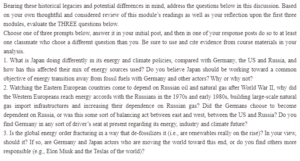The Politics of Energy-Japan
Unlike the US, Germany, and Russia, We’ll factors other than technological advancement and environmental factors influence energy policy and transitions in Japan. Catastrophic events have played a significant role in driving these policies. For instance, themodule’s011 Fukushima disaster significantly affected the country’s energy sources (CNBC, 2018). The accident led to the loss of 30% of Japan’s nuclear-based electric production within a short period.
After the crisis, Japan shifted its reliance from nuclear-powered generation to imported natural gas. The decision was based on the fact that the country’s non-fossil fuel energy sources were relatively low before the accident compared to economies like Germany and the US. Japan’s non-fossil fuels only accounted for 4.5% of the country’s electricity production before 2011 (CNBC, 2018). Besides, wind and solar-powered electricity generation was relatively low at the time. Nonetheless, the government has had no option but to adapt quickly and is on course to become a major solar and wind-powered energy producer.
Based on the above factors, it is unfair to pressure Japan to transition to clean energy generation like Germany and the US. The Asian economy, just like other major economic powers, is facing pressure to embrace clean energy (Shibata, 2022). However, the country’s vulnerabilities may not allow them to transition. Japan primarily relies on imported services; hence, setting deadlines for them to transition might be too much to ask.
Besides, Japan lacks a comprehensive strategy on energy matters. Such a critical transition will require a precise plan and resources that cannot be put together immediately (Shibata, 2022). Besides, the concept of energy security is yet to be fully understood in the country. Any move to hurriedly adopt clean energy and abandon traditional sources may lead to a major fuel insecurity crisis. If Japan surrenders its traditional origins and increases its dependence on imported energy, local fuel prices will increase significantly to the detriment of commoners.
References
CNBC. (2018, June 22). The dawn of Japan’s energy transition? CNBC. https://www.cnbc.com/advertorial/2018/06/22/the-dawn-of-japans-energy-transition.html
Shibata, N. (2022, January 3). Japan’s energy dilemma: How to achieve security alongside decarbonization. The Japan Times. https://www.japantimes.co.jp/opinion/2022/01/03/commentary/japan-commentary/energy-security-decarbonization/
ORDER A PLAGIARISM-FREE PAPER HERE
We’ll write everything from scratch
Question
Bearing these historical legacies and potential differences in mind, address the questions below in this discussion. Based on your own thoughtful and considered review of this module’s readings as well as your reflection upon the first three modules, evaluate the THREE questions below.

The Politics of Energy-Japan
Choose one of three prompts below, answer it in your initial post, and then in one of your response posts, do so to at least one classmate who chose a different question than you. Be sure to use and cite evidence from course materials in your analysis.
1. What is Japan doing differently in its energy and climate policies, compared with Germany, the US, and Russia, and how has this affected their mix of energy sources used? Do you believe Japan should be working toward a common objective of energy transition away from fossil fuels with Germany and other actors? Why or why not?
2. Watching the Eastern European countries come to depend on Russian oil and natural gas after World War II, why did the Western Europeans reach energy accords with the Russians in the 1970s and early 1980s, building large-scale natural gas import infrastructures and increasing their dependence on Russian gas? Did the Germans choose to become dependent on Russia, or was this some balancing act between East and West, between the US and Russia? Do you find Germany in any driver’s seat at present regarding its energy, industry, and climate future?
3. Is the global energy order fracturing in a way that de-fossilizes it (i.e., are renewables really on the rise)? In your view, should it? If so, are Germany and Japan actors who are moving the world toward this end, or do you find others more responsible (e.g., Elon Musk and the Teslas of the world)?


